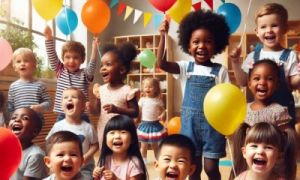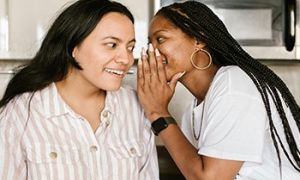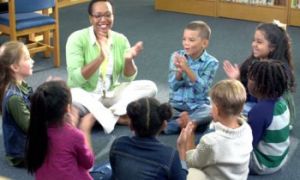

Australia is home to the world’s oldest continuous cultures, with First Nations Peoples holding stories, knowledge, and connections to Country that stretch back more than 65,000 years. Now, educators and students can explore these stories in a new way through Deep Time, a digital resource created by the ABC Education team.
In early childhood education, stories are more than entertainment; they’re vessels of culture, emotion, and connection. Aboriginal children’s books that explore water, wind, and nature offer rich opportunities to embed Indigenous perspectives, foster environmental awareness, and support holistic development. When paired with the 8 Aboriginal Ways of Learning and the EYLF, these stories become powerful tools for relational, symbolic, and experiential learning.
Music is a universal language—and in Aboriginal and Torres Strait Islander cultures, it’s also a powerful vessel for storytelling, ceremony, and connection. Introducing Aboriginal music into early learning environments not only enriches children’s understanding of Australia’s First Nations peoples but also fosters respect, curiosity, and cultural awareness from a young age.
This is a free template for families to participate in the Sea of Fish Challenge during NAIDOC Week 2025.
As part of National Reconciliation Week, Early Childhood Australia is offering two free professional learning courses. Initiating a Reconciliation Action Plan: Where do I start? and Reconciliation in Children’s Education and Care: Taking the First Steps, available free until 3 June.
Introducing Indigenous Australian stories to young children is vital for fostering cultural awareness, respect, and understanding. It teaches children about the histories and realities of Aboriginal and Torres Strait Islander peoples, promoting empathy and inclusivity, and emphasizes the importance of caring for the land and respecting nature, instilling a sense of responsibility in young readers. The following article provides a list of Top 10 Popular Indigenous Australian Books For Young Children, Main Themes Explored In These Books, Linking These Books To 8 Aboriginal Ways Of Learning, and more.
Yulunga means playing in the language of the Kamilaroi (Gamori) people of northwestern New South Wales. Suitable for preschool children, Yulunga can be used as an educational resource and as a guide to inclusive, structured sport within communities, developed by the Australian Sports Commission.
Incorporating Indigenous resources into playspaces helps create a culturally rich and inclusive environment that fosters respect, learning, and connection to First Nations traditions. Here are some ways to modify playspaces meaningfully to incorporate Aboriginal and Torres Strait Islander resources.
National Reconciliation Week (NRW) is an annual event, held from May 27 to June 3, that encourages all Australians to learn about the nation's shared histories, cultures, and achievements. Reconciliation Australia has free print-ready National Reconciliation Posters to download; they are also mailing printed posters by request, and free posters will be available at Officeworks nationwide.
A RAP, or Reconciliation Action Plan, is a formal framework designed to promote reconciliation between Indigenous and non-Indigenous Australians. It outlines practical actions to foster respectful relationships, create opportunities, and celebrate the rich cultures of Aboriginal and Torres Strait Islander peoples. The following article provides information on How To Develop A RAP, Examples of Initiatives To Include In A RAP, Creating A Reconciliation Action Plan, RAP Framework, Examples, and more.
 Here is the list of the EYLF Learning Outcomes that you can use as a guide or reference for your documentation and planning. The EYLF… Read More
Here is the list of the EYLF Learning Outcomes that you can use as a guide or reference for your documentation and planning. The EYLF… Read More
 The EYLF is a guide which consists of Principles, Practices and 5 main Learning Outcomes along with each of their sub outcomes, based on identity,… Read More
The EYLF is a guide which consists of Principles, Practices and 5 main Learning Outcomes along with each of their sub outcomes, based on identity,… Read More
 This is a guide on How to Write a Learning Story. It provides information on What Is A Learning Story, Writing A Learning Story, Sample… Read More
This is a guide on How to Write a Learning Story. It provides information on What Is A Learning Story, Writing A Learning Story, Sample… Read More
 One of the most important types of documentation methods that educators needs to be familiar with are “observations”. Observations are crucial for all early childhood… Read More
One of the most important types of documentation methods that educators needs to be familiar with are “observations”. Observations are crucial for all early childhood… Read More
 To support children achieve learning outcomes from the EYLF Framework, the following list gives educators examples of how to promote children's learning in each individual… Read More
To support children achieve learning outcomes from the EYLF Framework, the following list gives educators examples of how to promote children's learning in each individual… Read More
 Reflective practice is learning from everyday situations and issues and concerns that arise which form part of our daily routine while working in an early… Read More
Reflective practice is learning from everyday situations and issues and concerns that arise which form part of our daily routine while working in an early… Read More
 Within Australia, Programming and Planning is reflected and supported by the Early Years Learning Framework. Educators within early childhood settings, use the EYLF to guide… Read More
Within Australia, Programming and Planning is reflected and supported by the Early Years Learning Framework. Educators within early childhood settings, use the EYLF to guide… Read More
 When observing children, it's important that we use a range of different observation methods from running records, learning stories to photographs and work samples. Using… Read More
When observing children, it's important that we use a range of different observation methods from running records, learning stories to photographs and work samples. Using… Read More
 This is a guide for educators on what to observe under each sub learning outcome from the EYLF Framework, when a child is engaged in… Read More
This is a guide for educators on what to observe under each sub learning outcome from the EYLF Framework, when a child is engaged in… Read More
 The Early Years Learning Framework describes the curriculum as “all the interactions, experiences, activities, routines and events, planned and unplanned, that occur in an environment… Read More
The Early Years Learning Framework describes the curriculum as “all the interactions, experiences, activities, routines and events, planned and unplanned, that occur in an environment… Read More

Balloons are versatile, cheap, and can be used in a variety of different ways, including...
See more...
In early childhood education, trust and collaboration are foundational—not just for children, but for the...
See more...
Music in varied forms offers a plethora of benefits to children, whether they are listening...
See more...© 2009-2025 Aussie Childcare Network Pty Ltd. All Rights Reserved.

